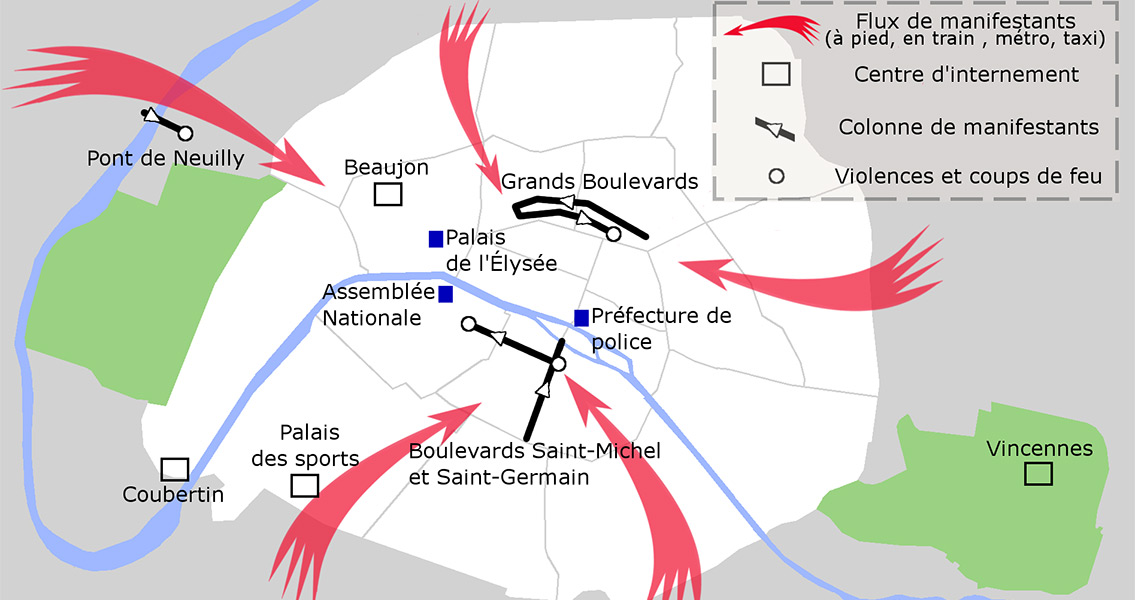<![CDATA[On 18th October, 1961, French media reported on a clash between police and Algerian protesters in Paris from the previous day. Official police sources stated that two people had been killed and sixty seven wounded in the 17th October clash after resisting arrest. The event received little media coverage in 1961, but its controversy has grown over time. A quick internet search will reveal that it is now generally referred to as a massacre led by the French police. Estimates for the number of casualties have risen dramatically, with claims that between 200 and 400 protesters were killed as a result of police aggression. In reality, there is no way of knowing just how many people died, perhaps giving an insight into the violence and chaos that descended on France's capital. For decades the French government seemed unwilling to acknowledge the events of 17th October 1961. The official narrative presented by French police of the evening was widely accepted with little attempt made at further investigation. It was only in 2012, on the 51st anniversary of the events, that French President Francois Hollande publicly paid homage to the victims of "bloody repression" by the police, ending a period of official denial. The general outlines of the events of the 17th October 1961 are clear, even if the extent of the violence is not. Paris had become increasingly tense in the shadow of the Algerian War for Independence, with elements of the conflict in the French colony reaching the city. Terrorist attacks had been launched in the city by Algerians, including random attacks on police officers. A clampdown followed, with police searching homes for Algerian terrorists and a curfew being placed on the Algerians living in Paris. On 17th October a group of some 30,000 Algerians defied the curfew which had been placed on them and gathered near the Seine. A substantial police force arrived, and quickly descended on the marchers in an attempt to disperse the protest. Events then become vague, with a combination of inflamed emotions and official attempts to withhold information obscuring reality. According to many eyewitnesses, participants and historians, the police cornered and bludgeoned the protesters, throwing injured, unconscious and dead Algerians into the Seine, or leaving them on the streets of Paris. Some have argued that the brutal efficiency of the police offensive could only have been pre-meditated. Two factors contributed to the unraveling of the attempted cover-up by French authorities. The first was the work of French historian Jean-Luc Einaudi, who defied the attempts at a cover up to reveal the true extent of police brutality. His book, 'La Bataille de Paris', published in 1991, was the first to depict the 17th October as an example of a vicious massacre. He went on to argue that the event was another battle in the Algerian War, an example of colonial repression in the heart of Paris. As he told France 24 in 2012, "On one hand, you have the emergence of an anti-colonial struggle in the very heart of the colonial power to support Algerian independence. On the other, you have a display of the full fury of the Paris police, a brutality that was the product of years of experience in the colonial war." The second factor concerns the then Paris prefect, Maurice Papon. In 1997, Papon was tried for his role in the deportation of French Jews from France during the Second World War. As documents were released in the landmark trial, which eventually saw Papon convicted for crimes against humanity, previously classified reports from 1961 were also unearthed, revealing that the casualties had been much higher than officially reported, and that Papon had told his officers they would be immune from any charges of excessive violence. Fifty four years later, French society seems to be slowly accepting the reality of what happened on the streets of Paris in 1961, although exact details of the events are far from clear. The anniversary of the first official reports of the Paris Massacre of 1961 are a reminder of the tragic events of the day and the brutal actions of the police. Just as significantly, they provide a reminder of the reaction of former colonial powers to their dwindling empires, and the time it can take for them to come to terms with the darkest moments in their history. Image courtesy of Wikimedia Commons user: S0l0xal]]>
Cover-up of Paris Massacre Begins
